Black Dyke and Grimethorpe Colliery Bands
29-Jul-2007113th Henry Wood Promenade Concert Series
20th Promenade Concert 2007
Conductors: Dr Nicholas Childs & Allan Withington
With His Majestys Sagbutts and Cornetts; Tashkent Uzbek Musicians
Musicians from the RNCM and Birmingham Conservatoire
Given that vast tracts of the BBC are currently in the invidious position of justifying themselves against accusations of a general dumbing down of output allied to an institutionalised degree of cynical cheating towards its viewers and listeners, it must have come as something of a relief that the current 113th season of the Henry Wood Promenade Concerts has attracted such good critical acclaim.
However, grateful as we are that the organisers have felt fit to welcome back a dedicated brass promenade concert for the first time in a generation, (albeit a matinee one – and still not felt worthy enough to be given live air time on any of its terrestrial television channels) you do still wonder if they really either understand or appreciate the medium. Using ‘The Floral Dance’ on the ‘live’ Radio 3 interval coverage as an introductory musical example to explain the cultural significance of brass band music making smacks either of crass snobbishness or a degree of lazy production values that would make a Channel Five programme on Posh & Becks seem like an Open University discourse on cultural sociology.
Still, those lucky enough to come and actually listen to the afternoon concert wouldn’t have had to put up with such tripe as they were rewarded with three and half hours of excellent brass music making – and not a single phone vote to spoil the occasion either.
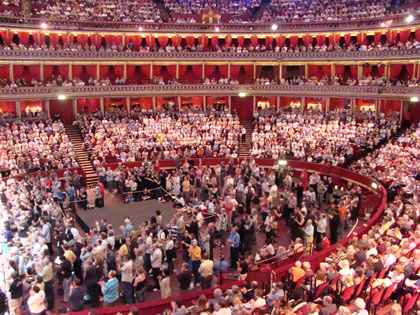
Who says you can't get an audience to listen to brass bands?
Even more encouraging both for the BBC Proms Director Nicholas Kenyon and the brass band movement as a whole was the size and composition of the audience. A rough head count placed it around 4,000 or more, whilst the staff at the box office told 4BR that the turnout was ‘significantly higher’ than expected. The make up of the listeners on the day was also interesting with a quick 4BR straw poll in the foyer revealing the majority of listeners to be either first time or occasional brass band aficionados.
There is always a ‘core’ Proms audience at any concert of the season of course (and there was the usual collection of mildly eccentric ‘Promenaders’ on display – including the obligatory one looking like a cross between Catweasel and Howard Hughes) but what was surely revealed was that there is a latent brass loving audience out there ready and willing to pay good money to be entertained by the very best that the brass band movement has to offer. As one occasional listener told 4BR: “I’ve come to listen to quality – simple as that.”
The programming of the concert allowed for variety, spectacle and innovation.
That was certainly evident with the opening item, Judith Bingham’s brass fanfare ‘Ziggurat’, commissioned by the BBC for the occasion and featuring players from the Royal Northern College of Music and Birmingham Conservatoire, conducted by Andre de Ridder. The sense of spectacle was enhanced by the staging of the fanfare in the centre of the hall on what looked like a hastily set up boxing ring – echoes of the King’s Hall at Belle Vue to many – and it proved to be an enjoyable piece of visual theatre.
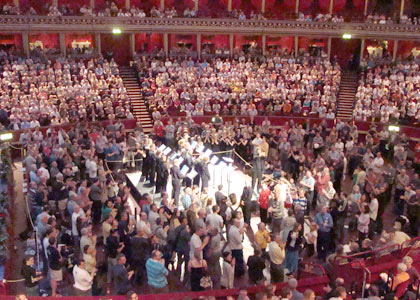
Echoes of the King's Hall at Belle Vue as the players open with Judith Bingham's 'Ziggurat'
Bingham is rightly regarded as one of the countries leading compositional voices, receiving a record three British Composer Awards. However, her relationship to the brass band movement has been scarred by the rather mindless criticism ‘Prague’ received when it was used as the Regional set work in 2003. Thankfully then for fans of her varied output, ‘Ziggurat’ was written for brass ensemble and is a musical depiction of the fabled Babylonian Etemenanki ziggurat – a structure of such immense proportions that it was said to be the model for the biblical ‘Tower of Babel’.
In just 2 minutes of complex writing the encoded fanfare, first made up of fragmentary pulses and motifs finally resolves into a glorious climax as if the ancient pilgrim finally comes to grips with an understanding of what they see towering before them. Oblique and fractured it may be, but ‘Ziggurat’ was an enjoyable, if rather different opener to say the least.
From the glory of the ancient world to the high alters of the renaissance and music of Monterverdi, Gabrieli and Grillo, featuring the impressive talents of His Majestys Sagbutts and Cornetts directed by Jeremy West.
This was quite glorious playing of a genre that never ceases to amaze and intrigue.
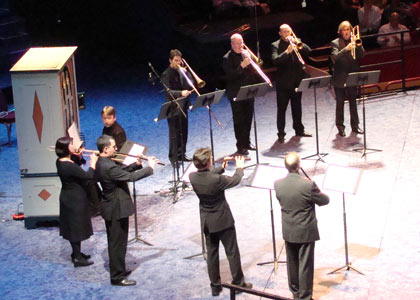
Majestic playing: His Majestys Sagbutts and Cornetts provide brilliant music making
At first the thought was that we were to be given a musical accompaniment to a medieval ‘Punch & Judy’ show, what with the rather neatly painted organ, which formed the fulcrum of the ensemble on stage. Not so, but what followed was simply exquisite playing of refined balanced and intuitive musicianship.
The quality of the playing was exemplary with precise diamond edged sharpness to the execution allied to a wonderful sense of balanced tonality even with the performers exchanging places for each item. 4BR was fortunate to be seated next to David Seville, a former executive with Yamaha Music and a real knowledgeable authority on the genre. He described it as quite wonderful playing and you had to agree. The balance and intonation of the small sackbutt trombones in particular was an object lesson in brass musicianship, with a delicacy to the sound that enabled detailed filigree work to enhance the impressive cornett detail (which sounded remarkably like a well tuned soprano cornet in the hands of Richard Thomas and Jamie Saven).
The innovative spectacle continued with the remarkable talents of the performers of Tashkent and their traditional Uzbeck Music featuring the amazing Karnay brass trumpets, which appear to be a cross between a gold plated alphorn and a six foot long curtain pole.
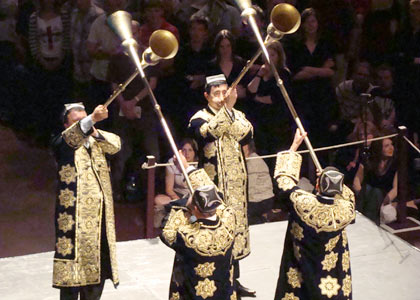
Let the trumpets sound! Uzbek Karnay trumpeters let rip
Dressed in what looked like the Uzbekistanian version of Black Dyke’s uniforms, the four trumpeters took to the stage with a percussion set of a kettle drum (nog’ra) and frame drum (doira) plus what sounded like to be a cross between a oboe and kazoo.
The next 15 minutes was quite unique, not least because of the sound the Karnay makes. It is hard to describe it accurately to give it its full glory, but imagine the noise of an enflamed hippopotamus crossed with Herefordshire Bull in the final throes of castration – all at a decibel level that could percolate coffee, and you may not even be close.
The music was mesmerisingly hypnotic: a never ending guttural harmonic drone (rather like those amazing throat singers of Tuva) all accompanied by neat choreography and amazing lung capacity, lip and arm stamina from the players. Somehow you couldn’t quite imagine yourself listening to 20 performances at the annual National Uzbekistan Karny Championships, but as a one off it was simply invigorating.
With a quick 20 minute break to enjoy an overpriced beer, (or tune into the Floral Dance on Radio 3) the second half of the concert featured Grimethorpe and Black Dyke.
Grimethorpe were on stunning form under the baton of Allan Withington. The Vaughan Williams Overture to ‘Henry V’ was delivered with a freshness and vibrancy that brought the music thrillingly to life. More complex a piece than you initially imagine, the MD allowed his players full rein to express themselves whilst keeping a firm grip on dynamics and tempi. The highlight came towards the end with a perfectly judged ‘Earl of Oxford’s March’ to close what was a performance of considerable note.
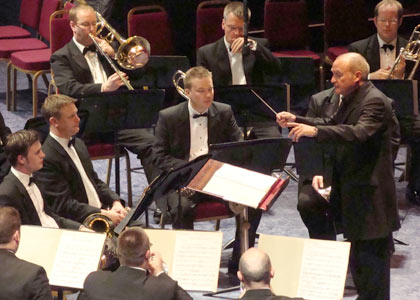
Overture to excellence: Grimethorpe deliver a superb 'Henry V' under Allan Withington
Hans Werner Henze’s ’Ragtimes and Habaneras’ was equally polished and executed with a lovely Cuban inspired feel full of subversive wit and subtle musical references. Each of the 11 movements flowed with a heady exotic mix of rum and cigars which brought sustained applause from a genuinely impressed audience, who gave Kevin Crockford in particular a rousing indication of their appreciation for his sterling efforts.
Black Dyke followed and although they didn’t quite hit the very highest peaks of their form, still produced two memorable performances of Heaton’s ‘Toccata: Oh The Blessed Lord’ and ‘…Dove Descending ' by Philip Wilby.
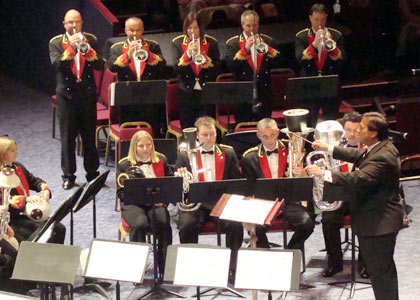
Precision execution: Nicholas Childs leads Black Dyke through their paces
The Heaton was quite something: Taut and precise in execution the MD still engineered a lovely musical flow to the music that brought a persuasive degree of pathos out of the writing – especially in the final climatic section of the work.
’...Dove Descending’ was also delivered in a memorable fashion with the opening fanfares and thematic development in Act 1 delivered with sparkling virtuosity. David Thornton was an outstanding solo voice, but some uncharacteristic flaws in solo lines did appear in the ‘Nativity’ (Peter Roberts excluded) that robbed the sense of tranquillity and evocation. The final resounding climax however was delivered with real bravura and once again the band and MD deserved the sustained applause from a knowledgeable audience.
The combined talents of the two leading bands in the current brass band movement was a sure fire opportunity to thrill, and that they did in spades with a cultured and precise account of the rejigged ‘Severn Suite’ original.
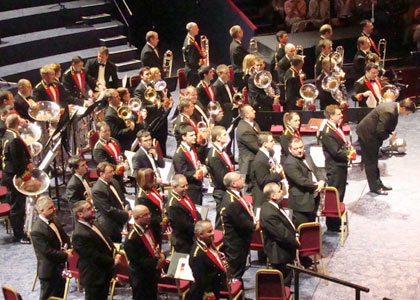
Taking the deserved applause: Nicholas Childs and the massed bands stand to receive the plaudits
Nicholas Childs produced an authentic Elgarian feel to the music and was rewarded with some fine individual and ensemble playing in return. Solo and ensemble features were excellently handled whilst there was intelligent use of resources to enable the detail of the music to be heard. It was a truly impressive performance of a work that went down particularly well in the hall.
A final 20 minute interval allowed time to assess what others felt, and the general impression from another quick straw poll was that the audience was suitably and genuinely impressed by both bands, entertained by the Uzbeks, intrigued by the Bingham and enthralled by the Sagbutts and Cornetts.
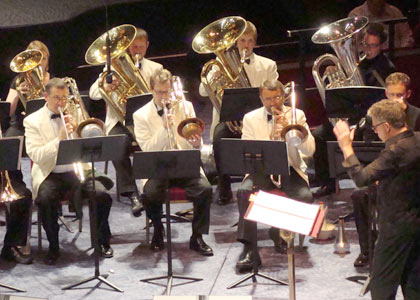
Not quite picture perfect: Hakan Hardenberger leads his players through a scruffy Exhibition
35 minutes later that opinion hadn’t changed although the performance of ‘Pictures at an Exhibition’ by the combined forces of brass players from the RNCM and Birmingham Conservatoire under the direction of Hakan Hardenberger was a bit of a disappointment given what had gone before.
This was a rather scruffy (and possibly under rehearsed) performance that although containing much to admire (Roger Webster’s contribution on flugel and trumpet throughout) never quite thrilled as it could and should have. Too often the ensemble lacked precision, whilst some of the tempi chosen by the MD saw struggles in many lines especially in ‘Baba- Yaga’, which at times was a mess.
Hardenberger was an enthusiastic presence at the helm, but rather confirming that reputation alone doesn’t ensure great precision in direction. The high error count throughout the performance, which at first didn’t register but then became rather too obvious and marked, took the gloss of what should have provided a rousing ending to a most enjoyable 20th Promenade Concert of the 2007 season.
It may have been some years in the making but this was an occasion to savour. Let’s hope it doesn’t take another decade or more before the BBC think brass bands worthy to grace a concert such as this again.
Iwan Fox.









